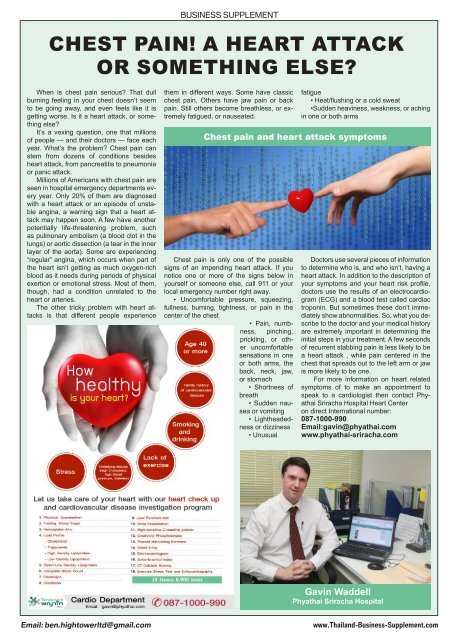Pattaya November 2018
Create successful ePaper yourself
Turn your PDF publications into a flip-book with our unique Google optimized e-Paper software.
BUSINESS SUPPLEMENT<br />
CHEST PAIN! A HEART ATTACK<br />
OR SOMETHING ELSE?<br />
When is chest pain serious? That dull<br />
burning feeling in your chest doesn’t seem<br />
to be going away, and even feels like it is<br />
getting worse. Is it a heart attack, or something<br />
else?<br />
It’s a vexing question, one that millions<br />
of people — and their doctors — face each<br />
year. What’s the problem? Chest pain can<br />
stem from dozens of conditions besides<br />
heart attack, from pancreatitis to pneumonia<br />
or panic attack.<br />
Millions of Americans with chest pain are<br />
seen in hospital emergency departments every<br />
year. Only 20% of them are diagnosed<br />
with a heart attack or an episode of unstable<br />
angina, a warning sign that a heart attack<br />
may happen soon. A few have another<br />
potentially life-threatening problem, such<br />
as pulmonary embolism (a blood clot in the<br />
lungs) or aortic dissection (a tear in the inner<br />
layer of the aorta). Some are experiencing<br />
“regular” angina, which occurs when part of<br />
the heart isn’t getting as much oxygen-rich<br />
blood as it needs during periods of physical<br />
exertion or emotional stress. Most of them,<br />
though, had a condition unrelated to the<br />
heart or arteries.<br />
The other tricky problem with heart attacks<br />
is that different people experience<br />
them in different ways. Some have classic<br />
chest pain. Others have jaw pain or back<br />
pain. Still others become breathless, or extremely<br />
fatigued, or nauseated.<br />
Chest pain is only one of the possible<br />
signs of an impending heart attack. If you<br />
notice one or more of the signs below in<br />
yourself or someone else, call 911 or your<br />
local emergency number right away.<br />
• Uncomfortable pressure, squeezing,<br />
fullness, burning, tightness, or pain in the<br />
center of the chest<br />
• Pain, numbness,<br />
pinching,<br />
prickling, or other<br />
uncomfortable<br />
sensations in one<br />
or both arms, the<br />
back, neck, jaw,<br />
or stomach<br />
• Shortness of<br />
breath<br />
• Sudden nausea<br />
or vomiting<br />
• Lightheadedness<br />
or dizziness<br />
• Unusual<br />
fatigue<br />
• Heat/flushing or a cold sweat<br />
•Sudden heaviness, weakness, or aching<br />
in one or both arms<br />
Chest pain and heart attack symptoms<br />
Doctors use several pieces of information<br />
to determine who is, and who isn’t, having a<br />
heart attack. In addition to the description of<br />
your symptoms and your heart risk profile,<br />
doctors use the results of an electrocardiogram<br />
(ECG) and a blood test called cardiac<br />
troponin. But sometimes these don’t immediately<br />
show abnormalities. So, what you describe<br />
to the doctor and your medical history<br />
are extremely important in determining the<br />
initial steps in your treatment. A few seconds<br />
of recurrent stabbing pain is less likely to be<br />
a heart attack , while pain centered in the<br />
chest that spreads out to the left arm or jaw<br />
is more likely to be one.<br />
For more information on heart related<br />
symptoms of to make an appointment to<br />
speak to a cardiologist then contact Phyathai<br />
Sriracha Hospital Heart Center<br />
on direct International number:<br />
087-1000-990<br />
Email:gavin@phyathai.com<br />
www.phyathai-sriracha.com<br />
Gavin Waddell<br />
Phyathai Sriracha Hospital<br />
Email: ben.hightowerltd@gmail.com<br />
www.Thailand-Business-Supplement.com

















